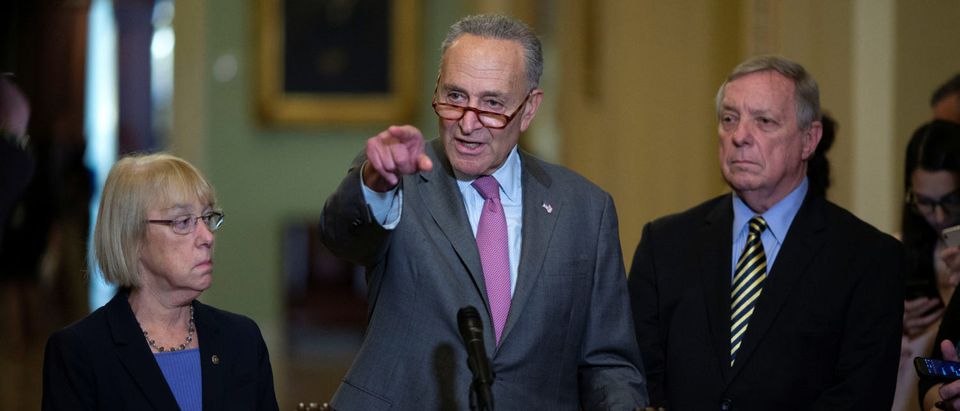When will the Federal Election Commission be open for business? The House Committee on Administration is set to hold a hearing on the issue on Sept. 25, but members are unlikely to agree on an answer.
Republican FEC Commissioner Matthew Petersen resigned his position at the end of August, leaving the six-member agency with a liberal majority — but depriving it of the four members required to conduct business. The three remaining commissioners include Democratic Chair Ellen Weintraub; Steven Walther, an independent selected by Democrats; and Republican Caroline Hunter.
Democrats have shown little interest in filling the three vacancies, arguing the dynamic shows the agency is “dysfunctional” and in need of permanent change.
“The Federal Election Commission is notoriously dysfunctional,” House Administration Committee Chair Zoe Lofgren, a California Democrat, said in an Aug. 27 statement. “Even with a working quorum of commissioners, the FEC has failed to fulfill its mission to enforce campaign finance laws … it has been mired in gridlock for years.” (RELATED: Democrats Are Looking To Make The FEC A Lot More Partisan)
Former Democratic Commissioner Ann Ravel, who served on the agency from 2013-17, echoed Lofgren’s sentiment in a Sept. 11 column. “Without additional members, the FEC will no longer be able to accomplish its most basic functions,” Ravel wrote. “Politics can now easily return to the days of Watergate.”
By law, no more than three of the agency’s six commissioners may come from the same party. As a result, enforcement matters often result in 3-3 votes. That has prevented Democrats from imposing sweeping new regulatory standards that would crack down on the internet and conservative media outlets.
“If five commissioners comprised the FEC instead of six, free YouTube videos and Fox News would have been punished when I was a commissioner,” Lee Goodman, who served as a Republican member of the commission from 2013-18, said in an interview.
“We last addressed the internet in … 2006, 2007,” Weintraub said in an interview with Vice. “And it’s a very different environment. Back then, YouTube was in its infancy, and the notion of something going viral at no cost, without somebody having to pay to place information on some medium that people would see — that notion just didn’t even exist back then.” (RELATED: FEC Chief Supported Russia-NRA Campaign Finance Probe Based Solely On ‘Vague’ News Article)
Democrats have grown increasingly bitter over the stalemate, saying the agency should be reconstituted with a partisan majority. House Democrats’ signature legislative proposal, H.R. 1, would accomplish that by reducing the number of commissioners to five.
In the absence of seismic institutional change, Democrats have suggested they would be amenable to at least restoring quorum as long as they hold a majority.
“I hope the Senate will consider a bipartisan pair of nominees, as it has in the past, to restore a quorum,” Lofgren said in a statement to the Center for Public Integrity’s Dave Levinthal, alluding to a tradition by which party leaders in the Senate recommend nominees to the president and confirm them in bipartisan pairs. The move would restore quorum and give Democrats a 3-2 advantage, while leaving one seat vacant.
The strategy seems to be one long in the making. Democratic Senate Minority Leader Chuck Schumer has yet to formally announce a replacement for Democratic Commissioner Ann Ravel, who left the commission in March 2017. President Trump, by contrast, nominated Republican Trey Trainor a year before Goodman’s resignation.
It also leads to another issue. All three members remaining on the commission have been in place for much longer than the six-year terms suggested by law. Hunter, the Republican, joined in 2008; Walther joined two years earlier; and Weintraub will be observing her 17th anniversary on the commission on Dec. 9, having served for nearly 40 percent of its existence. (For perspective, Supreme Court justices have served an average of 16 years.)
Observers believe Hunter is prepared to leave the agency if a replacement is on hand. Walther may not be far behind. Weintraub, who is serving her third term as chair (she also served as chair in 2003 and 2013), has provided no indication that she is prepared to depart.
“There is an ongoing effort to fill all six FEC commissioner seats,” a senior Republican Senate aide said in a statement. “To do that, though, Schumer and Senate Democrats must replace the two long-time Democratic holdovers. A clean slate of members will go a long way toward fixing some of the perceived dysfunction at the commission.”
Perhaps unsurprisingly, Republicans who served on the commission with Weintraub over the decades also believe it’s time for a fresh slate. “The FEC would benefit institutionally from fresh perspectives and new personalities,” Goodman said. “Each commissioner should honor Congress’ policy judgment and understand the agency is more important than any single person.”
Another former commissioner, who wished to remain anonymous, phrased it more bluntly, saying, “I presume Weintraub is in heaven. All she has to do now is take foreign trips and make grandstanding pronouncements on things outside her purview.”
Weintraub did not return a request for comment.
Brad Smith, who served as a Republican commissioner from 2000-05 before founding the Institute for Free Speech, concurred with Democrats who say the agency’s closure may not matter much. “Most campaigns aren’t going to obviously cheat. There will be much wailing and gnashing of teeth, but the American public won’t notice the difference.”












